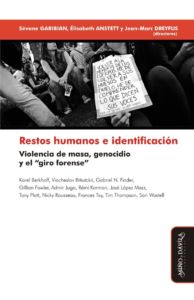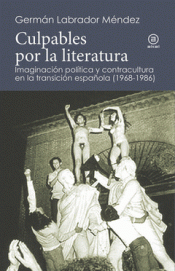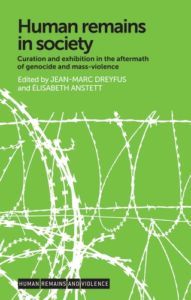CROSSLAND, ZOÉ (2017) Im/materialities: things and signs
|
FECHA
|
TÍTULO | AUTORA | TIPO |
|---|---|---|---|
|
2017 |
Im/materialities: things and signs | Zoé Crossland | Artículo |
|
FECHA
|
TÍTULO | AUTORA | TIPO |
|---|---|---|---|
|
2017 |
Im/materialities: things and signs | Zoé Crossland | Artículo |
|
FECHA
|
TÍTULO | AUTOR | TIPO |
|---|---|---|---|
|
2017 |
Paco Ferrándiz | Capítulo |
|
FECHA
|
TÍTULO | AUTORES/AS | TIPO |
|---|---|---|---|
|
2017 |
Zoe Crossland
|
Capítulo |
| Fecha de publicación | Título | Editores | Tipo |
|---|---|---|---|
|
2017
|
Restos humanos e identificación. Violencia de masa, genocidio y el «giro forense» | Sévane Garibian, Elisabeth Anstett y Jean-Marc Dreyfus | Libro |

Restos humanos e Identificación presenta una investigación pionera sobre las prácticas y metodologías utilizadas en la búsqueda y exhumación de cadáveres resultantes de la violencia de masa, anteriormente ausentes de la discusión sobre las prácticas forenses. Científicos sociales e historiadores confrontan aquí las exhumaciones históricas y contemporáneas con la aplicación del con-texto social para crear un diálogo innovador e interdisciplinario. Nunca antes un solo volumen examinó el contexto de las motivaciones y los intereses existentes detrás de estas persecuciones: cada capítulo revela los aspectos políticos, sociales y legales de la violencia de masa y sus secuelas.
Este libro sostiene que la aparición de las nuevas tecnologías para facilitar la identificación de los cadáveres ha dado lugar a un «giro forense» normalizando las exhumaciones como un método de ocuparse masivamente de los restos humanos. Sin embargo, ¿se llevan a cabo siempre estas exhumaciones por razones legítimas, y qué podemos aprender sobre las sociedades a partir de la forma en que se ocupan de esta consecuencia de la violencia de masa?
Multidisciplinario en su alcance, este libro presenta una selección innovadora de estudios de casos internacionales, incluyendo la identificación de los cadáveres por el Tribunal Penal Internacional para la ex Yugoslavia, el retorno de los restos humanos del Gulag ruso y los sitios de masacres judías del Holocausto, o la búsqueda de los cuerpos de los desaparecidos durante la dictadura militar en Uruguay. Restos humanos e identificación será atractivo para los lectores interesados en la comprensión de esta fase crucial de la secuela de la violencia de masa, incluyendo investigadores de historia, antropología, sociología, ciencia forense, derecho, política y guerra moderna.
COMPILADO Y DIRIGIDO POR: Sévane Garibian, Élisabeth Ansett y Jean-Marc Dreyfus.
ESCRIBEN: Karel Berkhoff, Viacheslav Bitiutckii, Gabriel N. Finder, Gillian Fowler, Admir Jugo, Rémi Korman, José López Mazz, Tony Platt, Nicky Rousseau, Frances Tay, Tim Thompson y Sari Wastell.
Consultar las primeras páginas (pdf)
| Fecha de publicación | Título | Autor | Tipo |
|---|---|---|---|
|
2017
|
Culpables por la literatura. Imaginación política y contracultura en la Transición Española (1968-1986) | German Labrador Méndez | Libro |

Han pasado cuarenta años de las elecciones de 1977 y el mito de la transición se ha desmoronado. ¿Pero sabemos lo que ocultaba?. Este libro plantea que, entre 1968 y 1986, existió una ciudadanía luchando por una democracia real más allá del estado y los partidos y cuyas ideas, a veces, recuerdan a las del 15M.
En la contracultura, política y cultura se unían radicalmente y la democracia era una nueva sensibilidad que lo afectaba todo: el amor, el trabajo, los cuerpos, el espacio público y el privado. Aquella creatividad fue reprimida y cooptada: política y cultura se dividieron e institucionalizaron mediante la Constitución de 1978 y La Movida de los ochenta. Sólo en el ámbito cotidiano, la ruptura con el franquismo fue más nítida. Aunque hemos olvidado los elevados costes personales y sociales de aquellas luchas contraculturales, que llevaron a la marginación de la juventud democrática (suicidios, cárceles, sida, heroína), hay una deuda de memoria con sus sueños, que este libro estudia, a partir de las voces de sus protagonistas y usando la literatura como guía de una democracia por venir.
| Fecha de publicación | Título | Editores | Tipo |
|---|---|---|---|
|
2016
|
Human remains in society. Curation and exhibition in the aftermath of genocide and mass-violence | Elisabeth Anstett y Jean-Marc Dreyfus | Libro |

Ya sea (re)enterrados, ocultos, almacenados, abandonados o expuestos públicamente, los restos humanos plantean un gran número de cuestiones relacionadas con sus usos sociales, legales y éticos. Este libro presenta un relato innovador del tratamiento y dignificación de los cadáveres resultantes de genocidio u otras violencias, a partir de una serie de estudios de casos internacionales, en los que se explora el efecto que los restos humanos tienen en diversas prácticas políticas, culturales y religiosas.
De alcance multidisciplinario, el libro pretende atraer a lectores/as interesados/as en las fases cruciales de la reconciliación post-conflicto, incluyendo estudiantes e investigadores de Historia, Antropología, Sociología, Arqueología, Derecho y/o Política.
TABLA DE CONTENIDOS:
Introduction. Corpses in society: about human remains, necro-politics, necro-economy and the legacy of mass violence – Élisabeth Anstett and Jean-Marc Dreyfus
1. The unburied victims of Kenya’s Mau Mau Rebellion: where and when does the violence end? – David M. Anderson and Paul J. Lane
2. (Re)politicising the dead in post-Holocaust Poland: the afterlives of human remains at the Belzec extermination camp – Zuzanna Dziuban
3. Chained corpses: warfare, politics and religion after the Habsburg Empire in the Julian March, 1930s-70s – Gaetano Dato
4. Exhumations in post-war rabbinical responsas – David Deutsch
5. (Re)cognising the corpse: individuality, identification and multidirectional memorialisation in post-genocide Rwanda – Ayala Maurer-Prager
6. Corpses of atonement: the discovery, commemoration and reinternment of eleven Alsatian victims of Nazi Terror, 1947-52 – Devlin M. Scofield
7. ‘Earth conceal not my blood’: forensic and archaeological approaches to locating the remains of Holocaust victims – Caroline Sturdy Colls
8. The return of Herero and Nama bones from Germany: the victims’ struggle for recognition and recurring genocide memories in Namibia – Vilho Amukwaya Shigwedha
9. A Beothuk skeleton (not) in a glass case: rumours of bones and the remembrance of an exterminated people in Newfoundland – the emotive immateriality of human remains – John Harries
Index
|
FECHA
|
TÍTULO | AUTORES/AS | TIPO |
|---|---|---|---|
|
2017 |
Fernando SERRULLA
Francisco ETXEBERRIA Lourdes HERRASTI José Luis CASCALLANA Julio DEL OLMO |
Capítulo |
|
FECHA
|
TÍTULO | AUTOR | TIPO |
|---|---|---|---|
|
2017 |
Poets of the Dead Society: The Cultural History of Francoist Mass Graves in the Pre-Democratic Poetic Archive | Germán LABRADOR MÉNDEZ | Capítulo |
|
FECHA
|
TÍTULO | AUTORA | TIPO |
|---|---|---|---|
|
2017 |
Executed Women, Assassinated Women: Gender Repression in the Spanish Civil War and the Violence of the Rebels | Queralt SOLÉ | Capítulo |
|
FECHA
|
TÍTULO | AUTORES | TIPO |
|---|---|---|---|
|
2017 |
The Spanish Civil War Forensic Labyrinth | Luis RÍOS
Francisco ETXEBERRIA |
Capítulo |
El pasado bajo tierra: exhumaciones y políticas de la memoria en la España contemporánea en perspectiva transnacional y comparada
Proyectos Asociados:
HISTOFOR: PID2024-159223NB-I00 (2026-20289
MEM2OR: BICON24084 (2025-2026)
NECROPOL: PID2019-104418RB-I00 (2020-2024)
SUBTIERRO: CSO2015-66104-R (2016-2019)
UNREST: H2020 REFLECTIVE-5-2015, ref. 693523 (2016-2019)
PASADO BAJO TIERRA: CSO2012-32709 (2013-2015)
ISTME: COST Action IS1203 (2012-2016)
POLMEM: CSO2009-09681 (2010-2013)
SPBUILD: 7PM MARIE CURIE, ITN 238589 (2010-2013)
PIE CSIC: 200710I006 (2007-2009). Las políticas de la memoria en la España contemporánea
Centro de Ciencias Humanas y Sociales - Consejo Superior de Investigaciones Científicas.
Despachos 1F25 y 1F18
C/Albasanz 26-28.
Madrid 28037 (España)
politicasdelamemoria@gmail.com
